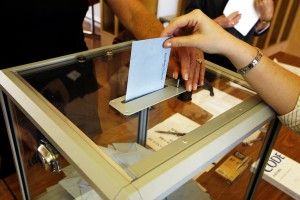Dislike of Clinton, Trump creates third-party moment
by Matt Fleming | June 27, 2016 8:09 am
 If there was ever an opportunity for a third-party run, now would be it.
If there was ever an opportunity for a third-party run, now would be it.
Unfavorable opinions among voters of both Donald Trump and Hillary Clinton — the presumptive presidential candidates of the Republican and Democratic parties, respectively — create a do-or-die moment for Libertarians and the Green Party.
But the question is how high can they climb?
In California, probably not very high. But nationally, there’s a great opportunity to get a candidate’s name, party and message out there if they can reach 15 percent in the polls[1] to make it to a debate. From there, ballot access is the main challenge.
The two main third-party candidates are Libertarian Gary Johnson, a former two-term governor of New Mexico, and Jill Stein, a Massachusetts physician and activist whose highest-held elected office was local, who will likely be the Green Party candidate.
Both were their parties’ nominees in 2012, but failed to gain any significant traction — Johnson won almost 1 percent of the popular vote and Stein won one-third of 1 percent. Neither won any states, which is still the biggest challenge for any third-party candidate (Johnson got 3.5 percent in New Mexico and outperformed Stein in Massachusetts).
So why now?
It’s an open seat, so there won’t be a popular incumbent president, like Barack Obama was in 2012, to contend with.
Also, Americans widely dislike the two (presumptive) major party candidates outside of their core groups of supporters. According to the Real Clear Politics average, 61 percent of Americans see Trump — a Republican business and reality T.V. tycoon — unfavorably, while Clinton — the former first lady, former senator and former secretary of state — fares only slightly better at 55.5 percent unfavorable. “We have never had an election in which both major candidates were so unpopular — many people want to vote against Trump or Clinton without voting for the other,” said John J. Pitney, Jr., a Roy P. Crocker professor of politics at Claremont McKenna College. “The third party option gives them the chance to register their disapproval without giving support to a candidate that they also despise.”
More than an emotional victory
The immediate goals for Libertarians in 2016 are securing ballot access in states and appearing on stage at the debates. Being on the debate stage alongside major party candidates would greatly affect how Americans see a third-party candidate — a victory in itself.
“But of course, you want to win,” said Janine Kloss, the executive director of both the Sacramento County Libertarian Party and the state party.
Kloss — who is awaiting the results of her write-in campaign for a Sacramento-area Assembly seat where a Democrat ran unopposed — noted that this election has proven anything can happen.
“We have someone under FBI investigation and someone who woke up one morning and decided he wanted to be president,” Kloss said.
Third-party candidates of yore
To gain traction, third party candidates usually need a major party candidate to fall apart. In 2006, Joe Lieberman lost the Democratic nomination in his Senate re-election campaign, but won the general as an independent because the Republican candidate collapsed. Bernie Sanders won his two Senate races in Vermont running as an independent because there was no Democratic challenger.
Jesse “The Body” Ventura was an exception to the trend. In 1998, the former pro wrestler beat two relatively strong candidates from the major parties by a narrow margin, winning the Minnesota governorship with 37 percent of the vote.
“They can be factors in a race, but winning is a different story and threshold,” said Nathan L. Gonzales, publisher and editor of The Rothenberg & Gonzales Political Report. “Our country is polarized and primed for the two major parties.”
Spoiler Alert
Often, strong third-party runs play a spoiler role for candidates, as Republicans were worried Trump would do earlier this cycle when they asked him to sign a loyalty pledge. In 1912, Bull Moose Party candidate Teddy Roosevelt stole (a lot) of votes from Republican Howard Taft, paving the way for Democrat Woodrow Wilson to become president.
Prominent segregationist George Wallace — the southern Democratic governor of Alabama who in 1968 ran as an American Independent — took a substantial amount of Electoral College votes from Hubert Humphrey in 1968 to help Richard M. Nixon become president.
Nixon actually had enough electoral votes to beat Humphrey without Wallace’s help, but Wallace still played a prominent role. And in a it’s-a-small-world way, Humphrey’s son was the Democratic-Farm-Labor candidate who lost the gubernatorial race to Ventura in Minnesota.
And Ross Perot, a Texas business man who ran twice as an independent, largely helped Bill Clinton, a Democrat, win the presidency from Republican George H.W. Bush in 1992 and then retain the presidency in 1996 against Republican Bob Dole.
In those races, Roosevelt received 27.4 percent of the popular vote, Wallace received 13.5 percent, and Perot received 18.9 percent and 8.4 percent. Roosevelt and Wallace won several states a piece, Perot won none.
“If more states allocated their Electoral College votes on some sort of proportional grounds, something Perot pushed for, then a third party ticket would be plausible,” said Mark Petracca, chair of the Department of Political Science at UC Irvine. “Right now only Maine and Nebraska have such an allocation scheme.”
- reach 15 percent in the polls: http://www.debates.org/index.php?page=overview
Source URL: https://calwatchdog.com/2016/06/27/dislike-clinton-trump-creates-third-party-moment/